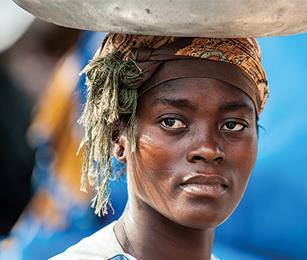
Head of Policy and Campaigns at Micah Challenge, Amanda Jackson shares her hopes for the year ahead ...
What do I hope for women in 2015? That God’s spiritual, economic and social restoration would free many women around the world – especially women who experience poverty, violence, brokenness and inequality.
1. I hope we will take risks to speak out, to show kindness and to care for women in need.
I hope we “spend ourselves” for the hungry and oppressed as it says in Isaiah 58. Spending implies a complete giving of our time and energy, not just a fitful interest. It is too easy to have a shallow humanity – we are shocked by stories of women and girls suffering, but we pass on to the next fashionable cause rather quickly. We click ‘like’ or ‘retweet’ and think we have shown commitment to a cause!
Angelina Jolie is a wonderful ambassador to create awareness of violence against women in conflict zones. But we should not really need a celebrity to remind us to care – it is embedded in our faith.
In 2015, we could all commit to one issue that will empower women and girls in our community – whether it’s joining a local anti-trafficking group or volunteering to mentor a teenage girl on the edges of society through a local charity.
We could also write to our local MP about the causes of inequality that affect the girl we mentor, or e-mail our HR boss at work to make sure the cleaners are being paid fairly.
2. I hope we are well informed about injustice facing women around the world.
This means discussing issues with our sons and daughters as well. It’s a bit more than my mum’s injunction to me whenever I didn’t want to eat dinner – “Think of all the starving children in Africa.” It’s knowing the facts behind the headlines so we can pray more effectively, keep God’s perspective on the world and take action.
The 276 girls captured by Boko Haram in north-east Nigeria are still missing as I write. They have been forgotten by the media as bigger stories wash over us from Iraq and Syria. Videos of the girls show them in full-length hijab – listless and scared. We can keep these girls in our heart and ask God for his patient compassion and commitment.
What else can be on our heart and mind?
a. Violence causes more death and disability worldwide amongst women aged 15-44 than war, cancer, malaria and traffic accidents. (World Bank Study World Development Report)
b. 99% of maternal deaths occur in developing countries – a woman dies every minute due to pregnancy-related causes. (UNPF 2007) Some of the worst statistics on maternal health are in countries where churches are very strong eg Nigeria, Zimbabwe
c. Women produce up to 80% of food in developing countries, but are more likely to be hungry than men, and are often denied the right to own land (FAO)
d. 41 million girls worldwide are still denied a primary education. (UNESCO, Education for all 2008)
It’s my hope that we support all efforts by churches, NGOs and governments to address such shocking statistics and speak out about the underlying reason that millions of women are still denied basic healthcare and education – and that reason is that women and girls are not valued.
Let’s not just tend to the wounds and pain but speak out about the cause of the pain. A first step could be to sign a petition or e-mail a company that is exploiting its (women) workers. Or we can step up to be a leader on these issues.
3. I hope we stay hopeful!
We should get angry at statistics that signpost suffering, but anger alone can make us cynical or despairing. And then we do nothing – ‘What good will it do if I take action?’ or ‘There’s too much suffering in the world.’
I like to talk about ‘angry hope’ – we cry over the suffering and want to change the bad stuff. But we remain hope-filled because we trust in a good God.
We will never change the whole world, but we stay the course, believing that we can change the lives of a few or even hundreds, or maybe thousands.
Malala’s name is known to us all – a girl who was shot three times by the Taliban in 2012 for encouraging girls in Pakistan to go to school. Now aged 16, she campaigns with gracious insight on the issue of girls’ education, despite death threats against her family.
If we live in the UK with freedom to speak out and freedom to vote and freedom to practise our faith, let’s be filled with gracious hope, angry hope, determined hope so we can make life better for women and girls around the world who do not have those freedoms.
+ Hear more from Amanda Jackson on Twitter @w2wglobal and @amandaraej2015



























